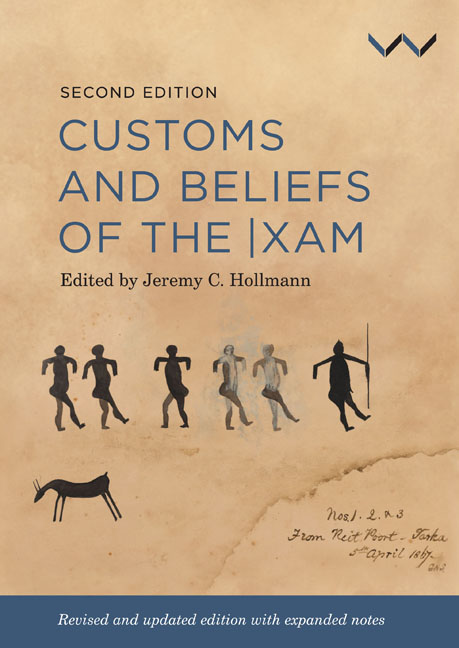Book contents
- Frontmatter
- Dedication
- Contents
- Acknowledgements
- Foreword To The Second Edition
- Foreword To The First Edition
- Introduction
- Contributors
- The |Xam Language
- The People In The Notebooks
- Part 1 Baboons
- Part 2 The Lion
- Part 3 Game Animals
- Part 4 Omens, Windmaking, Clouds
- Part 5 Rain
- Part 6 Rainmaking
- Part 7 Sorcerers
- Part 8 More About Sorcerers and Charms
- Part 9 Special Speech of Animals and Moon
- Appendix 1 |Xam Grammar
- Appendix 2 Summary of The Narratives
- References
- Index
Foreword To The First Edition
Published online by Cambridge University Press: 24 November 2023
- Frontmatter
- Dedication
- Contents
- Acknowledgements
- Foreword To The Second Edition
- Foreword To The First Edition
- Introduction
- Contributors
- The |Xam Language
- The People In The Notebooks
- Part 1 Baboons
- Part 2 The Lion
- Part 3 Game Animals
- Part 4 Omens, Windmaking, Clouds
- Part 5 Rain
- Part 6 Rainmaking
- Part 7 Sorcerers
- Part 8 More About Sorcerers and Charms
- Part 9 Special Speech of Animals and Moon
- Appendix 1 |Xam Grammar
- Appendix 2 Summary of The Narratives
- References
- Index
Summary
Imagine being in jail in a city that is hundreds of kilometres from your family and the stark rural landscape of your home. You try hard to remember every rock and every bush that is familiar to you. You are afraid to speak your own language. Your fellow prisoners and the warders do not understand your language and they call you stupid because you do not know what they say. Yet they are not stupid for misunderstanding you. One day, a strange man visits the prison and asks if you can teach him to speak as you do. He gets permission for you to live in the relative comfort of his home. Slowly you teach him and his sister-in-law how to use their tongues to make the click sounds in |xɑm. You say the names of objects and actions to them over and over again until they get them right. They take a long time to write the words down, and then stumble over them again the next day. You wonder if they will ever learn. After a few months they can put a sentence or two together and they ask you to tell them stories. At first, you tell them simple things. They find it hard to grasp why you laugh when you do, and you hang back when you realise they don't know enough to comprehend the depth of the story. The metaphors so obvious to you are lost on them. Their god is not the same as yours and you fear they have only a superficial understanding of the significance of your customs. Gradually you realise that, even though they do not understand, this may be one of the last opportunities your people will have to record the knowledge that has taken thousands of generations to accumulate. Even if your pupils don't understand what you tell them, you press on to educate them a little more every day, knowing that you will not be able to convey everything. The string that binds you together may break at any time. As you well know, storytelling is only one way to learn. Speaking about bows and arrows will not teach them how to be hunters.
These could be the thoughts of ‖kɑbbo, the grandfather whose knowledge and patience were the cornerstone of the |xɑm language and memories that were recorded in Cape Town in the nineteenth century.
- Type
- Chapter
- Information
- Customs and Beliefs of the |xam , pp. xix - xxiiPublisher: Wits University PressPrint publication year: 2022



